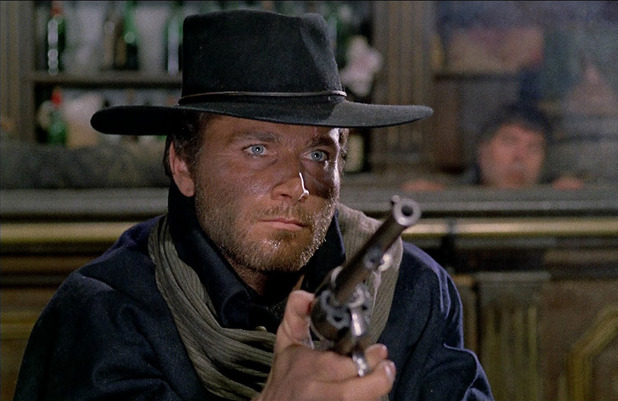← Back to Reviews
in
#578 - Django
Sergio Corbucci, 1966

A lone gunman becomes involved in a conflict that ranges between two groups of bandits as he seeks revenge against one gang's leader.
If that logline looks in any way familiar, it's because it does seem awfully similar to that of A Fistful of Dollars, another notable yet derivative spaghetti Western. Even though Django came out a mere two years after Leone's film it manages to provide enough distinction to at least make it a fairly worthwhile experience. A lot of that is down to the steely-eyed Franco Nero as the titular protagonist, who is distinguished right from the opening frames as he drags a coffin on a rope through the harsh desert before proceeding to rescue a courtesan from being tortured by bandits. Thus, he finds himself caught between two gangs, one made of American ex-militia members and the other made of Mexicans. Django has a score to settle with the leader of the American gang, but of course that quest for simple revenge is complicated by a tale involving not just the constantly-raging battle for victory between the two outfits but also the chance to acquire some gold in the process.
Like many an old genre film worth its salt, Django has a distinctive visual aesthetic that helps to carry its otherwise fairly standard plot. The grittiness common to all the best spaghetti Westerns is on full display here and definitely lends the film personality; this much is especially true considering how it manages to mimic A Fistful of Dollars but manages to induce even more cynicism from bitter beginning to a quick yet dramatic conclusion. The little tweaks, such as Django's coffin and his incredibly dramatic relationship with the woman he rescues, are nice ones but ultimately serve as window-dressing to a film that's not that bad so much as average. There are some good moments of action and suspense (the most memorable of which involves Django trying to sneak himself and his coffin out of a packed saloon), while the score involves some appropriately histrionic instrumentals and the iconic theme song (which I naturally recognised from its usage in Django Unchained - it seems like there's a fair bit of fun to be had in picking apart what Tarantino opted to appropriate from this film). Django is a good bet if you're into niche fare like this, but I'm hard-pressed to think of it as a classic in its own right. I would not be averse to re-watching it, of course, but even the various fun little aspects don't feel like enough to make it truly great.
Sergio Corbucci, 1966

A lone gunman becomes involved in a conflict that ranges between two groups of bandits as he seeks revenge against one gang's leader.
If that logline looks in any way familiar, it's because it does seem awfully similar to that of A Fistful of Dollars, another notable yet derivative spaghetti Western. Even though Django came out a mere two years after Leone's film it manages to provide enough distinction to at least make it a fairly worthwhile experience. A lot of that is down to the steely-eyed Franco Nero as the titular protagonist, who is distinguished right from the opening frames as he drags a coffin on a rope through the harsh desert before proceeding to rescue a courtesan from being tortured by bandits. Thus, he finds himself caught between two gangs, one made of American ex-militia members and the other made of Mexicans. Django has a score to settle with the leader of the American gang, but of course that quest for simple revenge is complicated by a tale involving not just the constantly-raging battle for victory between the two outfits but also the chance to acquire some gold in the process.
Like many an old genre film worth its salt, Django has a distinctive visual aesthetic that helps to carry its otherwise fairly standard plot. The grittiness common to all the best spaghetti Westerns is on full display here and definitely lends the film personality; this much is especially true considering how it manages to mimic A Fistful of Dollars but manages to induce even more cynicism from bitter beginning to a quick yet dramatic conclusion. The little tweaks, such as Django's coffin and his incredibly dramatic relationship with the woman he rescues, are nice ones but ultimately serve as window-dressing to a film that's not that bad so much as average. There are some good moments of action and suspense (the most memorable of which involves Django trying to sneak himself and his coffin out of a packed saloon), while the score involves some appropriately histrionic instrumentals and the iconic theme song (which I naturally recognised from its usage in Django Unchained - it seems like there's a fair bit of fun to be had in picking apart what Tarantino opted to appropriate from this film). Django is a good bet if you're into niche fare like this, but I'm hard-pressed to think of it as a classic in its own right. I would not be averse to re-watching it, of course, but even the various fun little aspects don't feel like enough to make it truly great.
